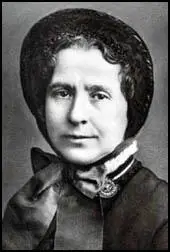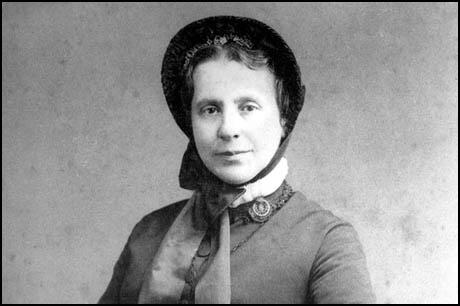Catherine Booth

Catherine Mumford, the daughter of a coachbuilder, was born in Ashbourne, Derbyshire, on 17th January 1829. When she was a child the family moved to Boston, Lincolnshire and later they lived in Brixton, London. Catherine was a devout Christian and by the age of twelve she had read the Bible eight times. She had a social conscience from an early age. On one occasion she protested to the local policeman that he had been too rough on a drunken man he had arrested and frog-marched to the local lock-up.
Catherine did not enjoy good health. At the age of fourteen she developed spinal curvature and four years later, incipient tuberculosis. It was while she was ill in bed that she began writing articles for magazines warning of the dangers of drinking alcohol. Catherine was a member of the local Band of Hope and a supporter of the national Temperance Society.
In 1852 Catherine met William Booth, a Methodist minister. William had strong views on the role of church ministers believing they should be "loosing the chains of injustice, freeing the captive and oppressed, sharing food and home, clothing the naked, and carrying out family responsibilities." Catherine shared William's commitment to social reform but disagreed with his views on women. Catherine was an avowed feminist. On one occasion she objected to William describing women as the "weaker sex". William was also opposed to the idea of women preachers. When Catherine argued with William about this he added that although he would not stop Catherine from preaching he would "not like it". Despite their disagreements about the role of women in the church, the couple married on 16th June 1855, at Stockwell New Chapel.
It was not until 1860 that Catherine Booth first started to preach. One day in Gateshead Bethesda Chapel, a strange compulsion seized her and she felt she must rise and speak. Later she recalled how an inner voice taunted her: "You will look like a fool and have nothing to say". Catherine decided that this was the Devil's voice: "That's just the point," she retorted, "I have never yet been willing to be a fool for Christ. Now I will be one."
Catherine's sermon was so impressive that William changed his mind about women's preachers. Catherine Booth soon developed a reputation as an outstanding speaker but many Christians were outraged by the idea. As Catherine pointed out at that time it was believed that a woman's place was in the home and "any respectable woman who raised her voice in public risked grave censure."
In 1864 the couple began in London's East End the Christian Mission which later developed into the Salvation Army. Catherine Booth took a leading role in these revival services and could often be seen preaching in the dockland parishes of Rotherhithe and Bermondsey. Though often imprisoned for preaching in the open air, members of the Salvation Army fought on, waging war on poverty and injustice.

The Church of England were at first extremely hostile to the Salvation Army. Lord Shaftesbury, a leading politician and evangelist, described William Booth as the "anti-christ". One of the main complaints against Booth was his "elevation of women to man's status". In the Salvation Army a woman officer enjoyed equal rights with a man. Although Booth had initially rejected the idea of women preachers, he had now completely changed his mind and wrote that "the best men in my Army are the women."
Catherine Booth began to organize what became known as Food-for-the-Million Shops where the poor could buy hot soup and a three-course dinner for sixpence. On special occasions such as Christmas Day, she would cook over 300 dinners to be distributed to the poor of London.
By 1882 a survey of London discovered that on one weeknight, there were almost 17,000 worshipping with the Salvation Army, compared to 11,000 in ordinary churches. Even, Dr. William Thornton, the Archbishop of York, had to accept that the Salvation Army was reaching people that the Church of England had failed to have any impact on.
It was while working with the poor in London that Catherine found out about what was known as "sweated labour". That is, women and children working long hours for low wages in very poor conditions. In the tenements of London, Catherine discovered red-eyed women hemming and stitching for eleven hours a day. These women were only paid 9d. a day, whereas men doing the same work in a factory were receiving over 3s. 6d. Catherine and fellow members of the Salvation Army attempted to shame employers into paying better wages. They also attempted to improve the working conditions of these women.
Catherine was particularly concerned about women making matches. Not only were these women only earning 1s. 4d. for a sixteen hour day, they were also risking their health when they dipped their match-heads in the yellow phosphorus supplied by manufacturers such as Bryant & May. A large number of these women suffered from 'Phossy Jaw' (necrosis of the bone) caused by the toxic fumes of the yellow phosphorus. The whole side of the face turned green and then black, discharging foul-smelling pus and finally death.
Women like Catherine Booth and Annie Beasant led a campaign against the use of yellow phosphorus. They pointed out that most other European countries produced matches tipped with harmless red phosphorus. Bryant & May responded that these matches were more expensive and that people would be unwilling to pay these higher prices.
Catherine Booth died of cancer on 4th October 1890. The campaigns that were started by Catherine were not abandoned. William Booth decided he would force companies to abandon the use of yellow phosphorus. In 1891 the Salvation Army opened its own match-factory in Old Ford, East London. Only using harmless red phosphorus, the workers were soon producing six million boxes a year. Whereas Bryant & May paid their workers just over twopence a gross, the Salvation Army paid their employees twice this amount.
William Booth organised conducted tours of MPs and journalists round this 'model' factory. He also took them to the homes of those "sweated workers" who were working eleven and twelve hours a day producing matches for companies like Bryant & May. The bad publicity that the company received forced the company to reconsider its actions. In 1901, Gilbert Bartholomew, managing director of Bryant & May, announced it had stopped used yellow phosphorus.
Catherine Booth and William Booth had eight children, all of whom were active in the Salvation Army. William Bramwell Booth (1856-1929) was chief of staff from 1880 and succeeded his father as general in 1912. Catherine's second son, Ballington Booth (1857-1940), was commander of the army in Australia (1883-1885) and the USA (1887-1896). One of her daughters, Evangeline Cory Booth (1865-1950) was elected General of the Salvation Army in 1934.
Primary Sources
(1) In the 1880s Charlotte Despard wrote an unpublished novel on the life of a factory girl called A Voice From the Dim Millions. The novel deals with the subject of working class poverty.
They call our deaths by many names - it is said to be consumption or heart-complaint or low-fever that is responsible… and people make it their boast that no one need die of starvation in England. But I should like to ask the doctors what is the cause of the consumption, the low-fever? In nine cases out of ten it is want - want that presses upon us day after day, year after year…. Two meals a day - sometimes only one - dry bread and tea, tea and dry bread… a straw mattress and bare boards at night with a thin sheet for covering. Stitch, stitch, for thirteen, fourteen, sixteen hours out of twenty-four. Headache, heartache, sickness, rheumatism, but no rest, for a day without earnings means the rent unpaid and the children crying for food. Is it a wonder that it kills?
(2) In December 1894, Charlotte Despard was election as a Poor Law Guardian for Vauxhall. Charlotte Despard objected to the way that Samuel Ayles, Master of the Renfrew Road Workhouse, punished elderly inmates by putting them on a bread and water diet. She wrote a letter explaining why Samuel Ayles should be removed from office.
Mr. Ayles permits the bread and water diet to be inflicted on persons (aged and weak women, the last about whom I enquired is 74) who are wholly unfit to bear it, and in fact would not bear it did not others supply them with part of their own food. I cannot, moreover, feel comfortable in leaving this matter in the hands of the Master, Mr. Ayles, a man not at all gifted as an administrator, and to my mind too young for the important and onerous post.
(3) Cicely Corbett Fisher, a representative of the Women's Industrial Council, gave a talk on sweated labour at East Grinstead in May 1912.
Sweated labour may be defined as (1) working long hours, (2) for low wages, (3) under insanitary conditions. Although its victims include men as well as women, women form the great majority of sweated workers. The chief difficulty is combating this evil abuse is that nearly all sweated work is done in the homes of the workers. During the recent strike of Jam makers in Bermondsey the wages of the girls only just sufficed to provide them with food, and left no margin whatsoever for the purchase of clothes, for which they were entirely dependent on gifts from friends… Chief among these evils of sweated labour is the exploitation of child labour. Children of six years and upwards were employed after school hours, in helping to add to the family output and even infants of 3, 4 and 5 years of age work anything from 3 to 6 hours a day in such labour as carding hooks and eyes to add a few pence per week to the wages of the household.
(4) George Lansbury, Looking Backwards and Forwards (1935)
I have heard some remarkable women orators. Some of them stand head and shoulders above all others. There was Catherine Booth, mother of the Salvation Army, who was one of the simplest exponents of the gospel of love I have ever heard. I think her speeches, sermons and appeals on behalf of the weak and the fallen were among the finest pieces of simple arresting oratory I have ever heard.
Her theology was rather hard and narrow, and very dogmatic. Later on she threw her energy into work on behalf of young girls and illegitimate babies. Her whole soul and spirit was poured out in an unceasing effort to make men realize their responsibility. In politics, she demanded legislation to raise the age of consent and provision for the maintenance of these unfortunate victims of our lack of individual and social responsibility.

